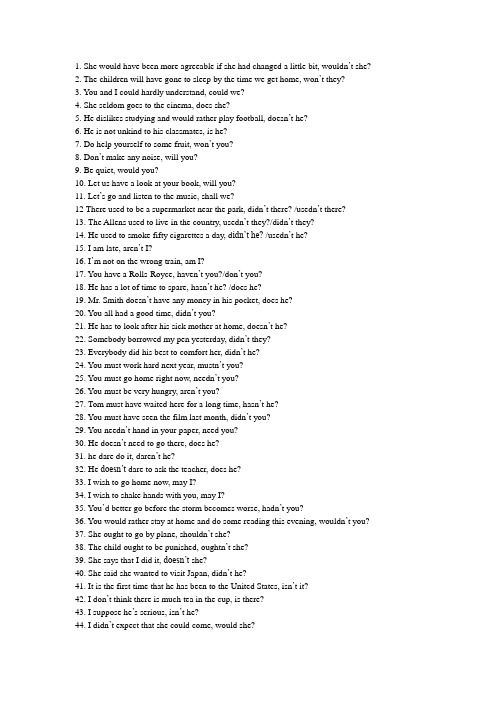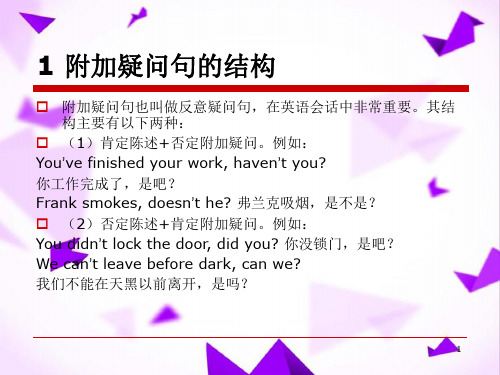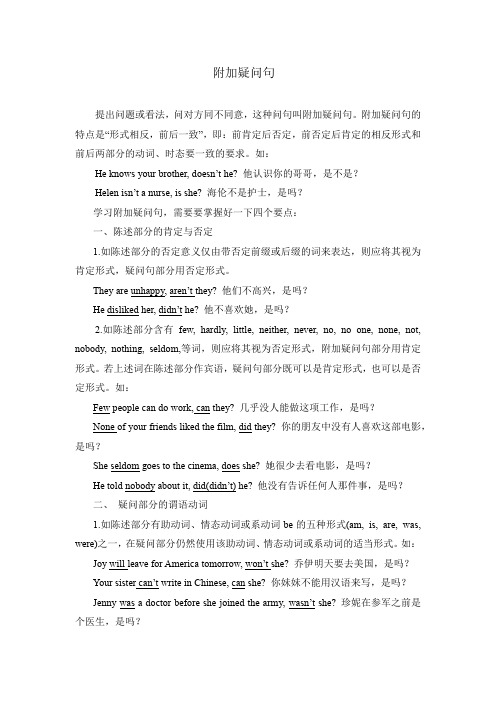附加疑问句
附加疑问句详解

一基本组成方法1. 肯定式陈述部分+否定附加疑问部分(前肯后否)You often play badminton, don’t you?否定式陈述部分+肯定附加疑问部分(前否后肯)They can’t finish it by Friday, can they?补充:1)当陈述句中含有seldom, hardly, never, rarely, little, few, none, neither,no, not, nowhere, nothing no one, nobody等否定意义的词时,后面的附加疑问句则为肯定形式。
They seldom come late, do they?He made no answer, did he?2)如果陈述句中仅含否定前缀的词unhappy, dislike, impossible等,则后面的附加疑问句仍为否定形式。
It is impossible, isn’t it?3.祈使句的附加疑问句(1)肯定的祈使句的附加疑问句在句末加“will you? /won’t you?/can you ?/ can’t you?”(2)否定的祈使句的附加疑问句通常在句末加“will you?”(3)Let's 开头的祈使句,附加疑问句用shall we?(4)Let us 开头的祈使句,附加疑问句用will you?二附加疑问句注意几种特殊情况:1. 当陈述部分主语是everyone/ everybody, someone/somebody, no one/ nobody, none等表示人的不定代词时,附加疑问句部分的主语多用they,但也可用he;当陈述部分的主语是everything, anything, something, nothing等表示物的不定代词时,附加疑问句部分的主语用it。
Nobody saw him walk into the room, did they?Everything has gone wrong today, hasn’t it?2.当陈述部分的主语是指示代词this, that时,附加疑问句的主语要用it。
附加疑问句

一、怎样确定附加问句部分的主语? 1. 陈述部分主语为this,that时,附加问句主
语用it; 陈述部分主语为these, those时,附加 问句主语用they。例如: That isn’t a good pen, is it? These are my books, aren’t they?
1. wouldn’t you 3. don’t they 5. didn’t she 7. doesn’t he/she 9. haven’t you 11. is there 13. shall we
答案
2. are you 4. didn’t he 6. sin’t it 8. wasn’t it 10. will they 12. aren’t you
He has a sister, hasn’t he (doesn’t he)?
They have bread for breakfast, don’t they?
Sarah had her washing machine repaired the day before yesterday, didn’t she?
everything等时,附加问句主语用it; 而陈述部分主 语为somebody, anybody, nobody, everybody等时, 附加问句主语用they,有时也用he。例如:
Everything begins to grow in spring, doesn’t it?
Someone is knocking at the door, aren’t they (isn’t he)?
主谓保持一致。
It’s the first time that you have come to China, isn’t it?
高考英语语法-附加疑问句

高考英语语法-附加疑问句1.当陈述部分的主语是I,而句子又用来征询对方的意见时,附加疑问句中的主语用you。
如: I find English very interesting, don't you?I don't like that film, do you?2.当陈述部分的主语是everybody, everyone, someone, nobody, n o one, somebody等合成代词时,附加疑问句中的主语通常用they。
但亦可用he,尤其是nobody, no one等作主语,具有否定概念时。
如:Somebody phoned while I was out, didn't they?Everyone enjoyed the party, didn't they?Nobody wants to go there, does he?3.当陈述部分的主语是不定代词everything, nothing, anything, s omething时,附加疑问句中的主语一般用it,不用they。
如:Everything seems all right now, doesn't it?Nothing is kept in good order, is it?Something must be done to stop pollution, isn't it?4.当陈述部分的主语是指示代词this, that或these, those时,附加疑问句中的主语分别用it和they。
如:This is important, isn't it? That isn't correct, is it?These are your friends Tom and Jack, aren't they?5.如果陈述部分是以代词one作主语,附加疑问句中的主语在正式场合用one,非正式场合用you,在美国英语中,在非正式场合还可以用he。
附加疑问句

1. She would have been more agreeable if she had changed a little bit, wouldn’t she?2. The children will have gone to sleep by the time we get home, won’t they?3. You and I could hardly understand, could we?4. She seldom goes to the cinema, does she?5. He dislikes studying and would rather play football, doesn’t he?6. He is not unkind to his classmates, is he?7. Do help yourself to some fruit, won’t you?8. Don’t make any noise, will you?9. Be quiet, would you?10. Let us have a look at your book, will you?11. Let’s go and listen to the music, shall we?12 There used to be a supermarket near the park, didn’t there? /usedn’t there?13. The Allens used to live in the country, usedn’t they?/didn’t they?14. He used to smoke fifty cigarettes a day, d idn’t he? /usedn’t he?15. I am late, aren’t I?16. I’m not on the wrong train, am I?17. You have a Rolls-Royce, haven’t you?/don’t you?18. He has a lot of time to spare, hasn’t he? /does he?19. Mr. Smith doesn’t have any money in his pocket, does he?20. You all had a good time, didn’t you?21. He has to look after his sick mother at home, doesn’t he?22. Somebody borrowed my pen yesterday, didn’t they?23. Everybody did his best to comfort her, didn’t he?24. You must work hard next year, mustn’t you?25. You must go home right now, needn’t you?26. You must be very hungry, aren’t you?27. Tom must have waited here for a long time, hasn’t he?28. You must have seen the film last month, didn’t you?29. You needn’t hand in your paper, need you?30. He doesn’t need to go there, does he?31. he dare do it, daren’t he?32. He doesn’t dare to ask the teacher, does he?33. I wish to go home now, may I?34. I wish to shake hands with you, may I?35. You’d better go before the storm becomes worse, hadn’t you?36. You would rather stay at home and do some reading this evening, wouldn’t you?37. She ought to go by plane, shouldn’t she?38. The child ought to be punished, oughtn’t she?39. She says that I did it, doesn’t she?40. She said she wanted to visit Japan, didn’t he?41. It is the first time that he has been to the United States, isn’t it?42. I don’t think there is much tea in the cup, is there?43. I suppose he’s serious, isn’t he?44. I didn’t expect that she could come, would she?45. They don’t think she knew anything about it, do they?46. He said his sisters wanted to visit Japan didn’t he?47. Tom has been writing letters all afternoon but he should finish them now, shouldn’t he?48. Mr. Smith had been to Beijing for several times, and he should have been in China now,shouldn’t he?49. When you have finished with the video tape, don’t forget to put it in my drawer, will you?50. A hibernating animal needs hardly any food all through the winter, does it?51. GO straight into the cave and find out what’s in there, will you?52. He demanded that we explain what was happening, didn’t he?If your car ______ any attention during the first 12 months, take it to an authorized dealer.A. shall needB. should needC. would needD. will need。
实用英语语法教程附加疑问句

5
3 附加疑问句的谓语动词
3.1 否定词与附加疑问句
(1) 陈述部分带有hardly, scarcely, barely, rarely, seldom, few, little 等半否定词时,附加疑问部分用肯定式。例如:
问部分的主语一律用it。例如: To master French is difficult, isn’t it? 掌握法语很难,是吗? What she said was believable, wasn’t it? 她说的话是可信的,对
吗? (6)在there be 句型中,附加疑问部分无主语,主语用引导词
could you?, would you? 等表示“请求”、“客气”等意义。 例如: Post this parcel for me, can you /could you/ would you?请 你帮我把这个包裹寄了,好吗? Take a seat, will you / won’t you? 请坐吧。
义疑问句用isn’t/wasn’t it? 3. C have to + 动词(had to + 动词),反义
疑问句用 don’t +主语(didn’t +主语)。 4. B 陈述部分的谓语动词带否定意义或形容词带
有否定意义的前缀或后缀时,附加疑问部分仍用否 定式。 5. D 陈述部分的主句是I think,I suppose, I believe等结构时,附加问句部分则往往与that-分 句中的主语和谓语动词保持对应关系。
附加疑问句

附加疑问句提出问题或看法,问对方同不同意,这种问句叫附加疑问句。
附加疑问句的特点是“形式相反,前后一致”,即:前肯定后否定,前否定后肯定的相反形式和前后两部分的动词、时态要一致的要求。
如:He knows your brother, doesn’t he? 他认识你的哥哥,是不是?Helen isn’t a nurse, is she? 海伦不是护士,是吗?学习附加疑问句,需要要掌握好一下四个要点:一、陈述部分的肯定与否定1.如陈述部分的否定意义仅由带否定前缀或后缀的词来表达,则应将其视为肯定形式,疑问句部分用否定形式。
They are unhappy, aren’t they? 他们不高兴,是吗?He disliked her, didn’t he? 他不喜欢她,是吗?2.如陈述部分含有few, hardly, little, neither, never, no, no one, none, not, nobody, nothing, seldom,等词,则应将其视为否定形式,附加疑问句部分用肯定形式。
若上述词在陈述部分作宾语,疑问句部分既可以是肯定形式,也可以是否定形式。
如:Few people can do work, can they? 几乎没人能做这项工作,是吗?None of your friends liked the film, did they? 你的朋友中没有人喜欢这部电影,是吗?She seldom goes to the cinema, does she? 她很少去看电影,是吗?He told nobody about it, did(didn’t) he? 他没有告诉任何人那件事,是吗?二、疑问部分的谓语动词1.如陈述部分有助动词、情态动词或系动词be的五种形式(am, is, are, was, were)之一,在疑问部分仍然使用该助动词、情态动词或系动词的适当形式。
附加疑问句
附加疑问加问句构成,表示问话人有一定的看法,但并不完全肯定,需要对方证实。反意的附加疑问句的规则是: 当陈述部分为肯定句时,附加问句部分用否定形式;当陈述部分为否定句时,附加问句部分用肯定形式。非反意的附加疑问句的陈述部分和附加问句部分要么同是肯定的,要么同是否定的。如:
2)对已发生的过去情况的推测,若陈述句谓语部分有“must have done”,而且有表示过去的时间状语,问句部分用didn't;若没有表示过去的时间状语,问句部分用haven't或hasn't。如:
They must have gone there last night,didn't they?
九、含had better的陈述句,附加部分用助动词had; 含would 的陈述句,附加部分动词用would。例如:
You'd better go home now, hadn't you? 你最好现在回家,好不好?
You'd like to see the film, wouldn't you? 你很想看电影,是吗?
They must have arrived by now,haven't they?(根据by now来判断)
They must have been to the Great Wall,haven't they?
3)若是被动,应按被动结构来处理。如:
The room must have been cleaned yesterday,wasn't it?
I believe that you will enjoy the party, won't you? 我相信你会喜欢这次聚会的,不是吗?
附加疑问句的句型变化
附加疑问句的句型变化附加疑问句是一种特殊的疑问句形式,用于向对方确认或询问某个问题,通常用于陈述句之后。
附加疑问句的结构通常包含一个反问词或短语,接着是一个助动词或情态动词,最后是一个主语和谓语动词。
以下是附加疑问句的一些常见句型变化。
1. 如果陈述句是肯定形式,附加疑问句用否定形式:- He can swim, can't he?(他会游泳,对吧?)- She has seen the movie, hasn't she?(她看过这部电影,对吧?)2. 如果陈述句是否定形式,附加疑问句用肯定形式:- You aren't going to the party, are you?(你不打算去参加派对,是吗?)- He can't swim, can he?(他不会游泳,是吗?)- She hasn't seen the movie, has she?(她没看过这部电影,是吗?)3. 如果陈述句中有情态动词,附加疑问句中的助动词通常省略:- You should go, shouldn't you?(你应该去,是吗?)- He must study hard, mustn't he?(他必须努力研究,不是吗?)- She could swim well, couldn't she?(她以前会游泳,对吧?)4. 附加疑问句中的主语和谓语动词通常与陈述句保持一致:- He likes coffee, doesn't he?(他喜欢咖啡,对吧?)- I should leave now, shouldn't I?(我现在该走了,对吧?)需要注意的是,附加疑问句的作用不仅是提问,还可以表示对方是否同意或不同意。
因此,在使用附加疑问句时,需要根据语境和表达意图来选择适当的句型变化。
这些是附加疑问句的一些常见句型变化,希望对您有所帮助。
附加疑问句
anyone, someone, no one, anobody, ...
they
Everyone knows that writer, don’t they?
Somebody left just now, didn’t they?
anything, nothing,
it
Nothing in the world is difficult, is it?
You must be very excited, aren’t you?
表推测”一定,准是”,与must后的动词照应。
must
You must leave right now, mustn’t you?
表“必须”,用mustn’t。
You mustn’t walk on grass, must you?
不要嘲笑别人,好吗?
构成原则
系动词
am, is, are, was, were;
助动词
do, does, did; have, has, had;
情态动词 will, would, shall, should, can, could, used, ought,
must, need, dare, ...
8. 含有宾语从句的附加疑问句: (具体内容转下页)
8. 含有宾语从句的附加疑问句: 1)陈述部分带有宾语从句时,附加疑问句部分的主语和谓语与主句的 语和谓语保持一致。
He said that he was ready to help, _d_i_d_n_’_t_h_e___?
2)主句谓语动词think, believe, suppose, guess, expect, imagine的主语为第 一人称时,附加疑问句部分与从句一致;主句为第二、三人称时,附加 疑问句部分与主句一致。
附加疑问句讲解与练习
附加疑问句讲解与练习一、定义:陈述句后面附加一个简短的疑问句就叫附加疑问句。
二、分类:(一)、反意附加疑问句。
(二)、非反意附加疑问句(不作要求)。
三、作用:要求对方证实所叙之事,以尊重对方、缓和气氛、缩短距离、融洽感情。
四、形式:(一)、肯定陈述句+否认疑问句的简略式:1、He can work it out, ?2、Tom stayed at home yesterday, ?(二)、否认陈述句或含有否认意义词语(little、few几乎没有;no不;never 决不、从不;nothing没有什么事(物);nobody没有人;hardly\seldom几乎不;too…to…太…以致不能…)的肯定句+肯定疑问句的简略式:1、You can*t swim, ?2、They didn*t come an hour ago, ?3、She has never been there, ?4、He has few friends here, ?5、There is nothing wrong with my watch, ?6、We were too tired to work, ?五、构成:(一)、动词的选用:取决于前面陈述句中谓语动词的种类和时态:1、be的系动词:是(am \is---was; are—were;)(1)、He is a worker, ?(2)、You were ill yesterd ay, ?(3)、They are at school now, ?(4)、His sister was happy just now, ?2、be和其它助动词(am\is\are协助构成现在实行时和be going to的一般将来时;was\were协助构成过去实行时;will协助构成一般将来时; have\has协助构成现在完成时)(1)、His father is talking with him, ?(2)、Children were playing computer, ?(3)、You are going to wash clothes, ?(4)、We will go home, ?(5)、Your mother has gone to Beijing, ?3、情态动词:can\may\must\would\should\could….)(1)、You can fly kites, ?(2)、I must finish my homework now, ?(3)、You should go, ?4、实义(行为)动词的一般现在时用do(does)构成;一般过去时用did构成:(1)、WeiHua likes bananas, ?(2)、We go to school by bike every day, ?(3)、LiLei played piano yesterday, ?(4)、My father bought a bike for me, ?(二)、主语(人或物)的确定:附加疑问句的主语(人或物)与前面陈述句中的人或物在人称和数上保持一致。
- 1、下载文档前请自行甄别文档内容的完整性,平台不提供额外的编辑、内容补充、找答案等附加服务。
- 2、"仅部分预览"的文档,不可在线预览部分如存在完整性等问题,可反馈申请退款(可完整预览的文档不适用该条件!)。
- 3、如文档侵犯您的权益,请联系客服反馈,我们会尽快为您处理(人工客服工作时间:9:00-18:30)。
附加疑问句(Tag Question)
附加疑问句有以下四种形式:
①肯定陈述句+否定的附加疑问句That clock is slow, isn’t it?
②否定的陈述句+肯定的疑问句That clock isn’t slow, is it?
③肯定陈述句+肯定的疑问句That clock is slow, is it?
④否定的陈述句+否定的附加疑问句That clock isn’t slow, isn’t it? 前两种是主要的,后两种形式仅在特定的语境中表示感情色彩。
附加疑问句也可以由“祈使句 + 附加问句”构成
e.g. Carry this parcel for me, will you?
Remember to buy some meat, won’t you?
a)当陈述句部分的主语是everybody, everyone, someone, no one, nobody, somebody等指人的合成词时,附加问句部分的主语在正式语体中通常用he。
e.g. Everybody knows what he has to do, doesn’t he?
Nobody wants to go there, does he?None of the boys can do it, can he?
在非正式语体中则往往用they。
e.g. Nobody phoned while I was out, did they?
Everyone enjoyed the party, didn’t they?
Somebody borrowed my pen yesterday, didn’t they?
但若陈述部分的主语是everything, anything, something, nothing等指物的合成词时,附加问句部分的主语只能用it。
e.g. Nothing could make me give it up, could it?
Everything is ready, isn’t it?
b)当陈述部分是there-存在句时,附加问句部分主语也用~there?
e.g.There’s no help for it, is there?There’s something wrong, isn’t t here?
c) 陈述部分带有seldom, hardly, never, rarely, few, little, nowhere, nothing等否定词或半否定词时,附加问句部分用动词肯定形式。
e.g. Bob hardly got drunk, did he?There is little time, is there?
She never goes to the cinema, does she?
如果陈述部分的否定词仅带有否定前缀,那么,该陈述部分当肯定句处理,附加问句部分一般仍用否定形式。
e.g. He was unhappy, wasn’t he
d)如果陈述部分是I’m…结构,附加问句部分一般用aren’t I.
e.g. I’m late, aren’t I.
e)如果陈述部分以不定代词one作主语,附加问句部分的主语在正式场合用one, 在非正式场合用you。
e.g. One can’t be too careful, can one?/can you?
f)当陈述部分是一个带有that-分句做宾语的主从结构时,附加问句部分一般应与主句的主语和谓语保持对应关系。
e.g. You think (that) you are funny, don’t you?
He thinks (that) he is going to become a doctor, doesn’t he?
She says (that) I did it, doesn’t she?
但是,当陈述部分的主句是I suppose, I think, I believe, I suspect, I imagine等结构时,附加问句部分则往往是that-分句中主语和谓语动
词保持对应关系,但要注意否定的转移。
e.g. I think (that) he’s afraid of me, isn’t he?
I don’t think (that) she cares, does she?
g)陈述部分带有情态助动词used to 时,附加问句部分可用used to 形式或did 形式。
e.g. The Allens used to live in the country, usedn’t they?
He used to smoke fifty cigarettes a day, didn’t he?
h)陈述部分带有情态助动词needn’t 时,附加问句部分通常仍用need。
e.g. You needn’t go yet, need you? 在这里也可用must,作必要讲i)陈述部分带有情态助动词must 表示义务时,附加问句部分通常仍用must。
e.g. You must work hard next term, mustn’t you?
You mustn’t walk on the gras s, must you?
但当must作“有必要”解释时,随后的附加问句部分既可用mustn’t,也可用needn’t。
e.g. You must go home right now, mustn’t you/needn’t you?
而常用的肯定的形式我们用must~?否定形式用needn’t ~?
当must表示“一定,想必”等推测性意义时,附加问句部分仍用must。
e.g. He must be very tired, mustn’t he?
在这种语境中,间或也可根据上下问采用其他的动词。
e.g. He must be very tired, isn’t he?
He must have waited here for a long time, hasn’t he?
You must have seen the play last week, didn’t you?
j)在由“祈使句+ 附加问句”构成的附加问句中,附加问句部分一般用will you, won’t you, would you.
e.g. Don’t move the chair, will you? Be quiet, would you?
有时也可用can you, can’t you, why don’t you, could you等。
e.g. Give me some cigarettes, can you?Be quiet, can’t you?
但是在以Let’s开首的祈使句后,附加问句部分用shall we?
e.g. Let’s go fishing, shall we?Let’s stop here, shall we?
以Let us开首的祈使句,如果含义是allow us, 不包括听话人在内时,附加问句部分用will you,也就是当一般的祈使句处理。
e.g. Let us go now, will you?
Let us have a look at your photo, will you?
k)另外请注意陈述部分有have(has, had)的情况.
e.g. You often have headaches, don’t you?
She had a good time, didn’t she?
Tom has to walk to school, doesn’t he?
He has already had his breakfast, hasn’t he?
You’d better turn off the computer, hadn’t you?
You have a lot of money, haven't you/don't you?。
